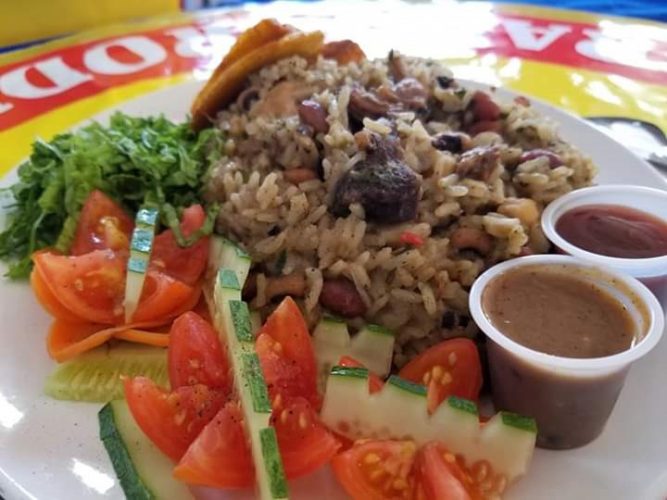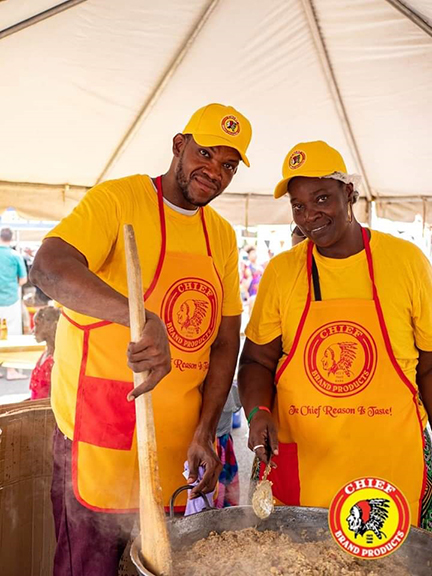The Davis family fits snugly into a fast-emerging entrepreneurial category seeking to occupy those spaces in the small business sector which have long been lying vacant. The slow pace at which these are being occupied is due mainly to a combination of the financial constraints of would-be investors and a jitteriness arising out of a lack of ‘business experience.’ These days, however, circumstances are inducing a greater inclination to take risks.
It did not take their victory at this year’s highly competitive Emancipation Day Cook-Up-Rice Competition at the National Park to persuade the Davis’ that their culinary skills were good enough to be transformed into a worthwhile entrepreneurial venture. Those, Nichola, Team Davis’ ‘top hand’, told Stabroek Business, have long been tried and tested through various demanding catering jobs and through the weekend snack foods service that they offer from their East Ruimveldt home.
When we met with Nichola and Simeon, her son and ‘number two’, we wanted to know more about what might have taken her to the Emancipation Day Cook-up-Rice competition and whether the Davis’ are one of those thousands of home-based ‘family businesses’ waiting for far too long to enter into the real world of entrepreneurship.

When she talks about the Davis’ culinary competence, Nichola is casual and confident. They had entered the Cook-up-Rice competition previously and this year they were not particularly surprised that they had won.
That giant step-up in the world of business, however, is yet to come. The family’s target, Nichola says, is the acquisition of a customised mobile service, ‘kitted out’ to offer on-board kitchen facilities, its mobility allowing for access to markets that go beyond their East Ruimveldt home where on Saturdays, they offer patrons both within and outside the community, samplings of a range of creole fare.
She estimates that such a venture will probably amount to a three million dollar investment so that for the time being at least, the venture is located somewhere in that space between aspiration and accomplishment. In the meantime the Davis’ appear to have settled for the patronage which the family’s culinary talents have attracted in the form of catering contracts associated with myriad events ranging from weddings to ‘wakes’ and the brisk Saturday trade from the family home.
If she does not appear to be brooding over as yet unrealised ambitions there is an unmistakable eagerness, even impatience in Nichola to bring the family’s talents to a bigger stage.
Simeon comes across as a loyal deputy with his own particular culinary talents numbered among which, Nichola says, are his pepperpot-making skills. He acknowledges his mother’s accolade with a broad grin, never however, venturing comments that would place him beyond the role as his mother’s capable helper. When she talked about the outcome of the Freedom Day Cook-up-Rice Competition, however, Nichola is mindful not to omit what she says was Simeon’s considerable contribution out of ‘the frame’.
When you peruse the landscape of unrealised entrepreneurial dreams in Guyana, the biggest stumbling block to ‘getting there’ is invariably the lack of investment capital and the corresponding conservative disposition of the commercial banking sector towards what it regards as risky investments in ventures with no reassuring track record to speak about. Change, if it is occurring, is moving at a snail’s pace. Meanwhile, the survival-related pressures for home-grown enterprises like the Davis’ are growing. Competition-related pressures and standards requirements which low-budget pursuits can ill-afford are pushing those already on the periphery closer to the edge.
Most of what is left for the dream which the Davis’ have of building a successful food business is located in Nichola’s undiminished confidence in the collective talents of her family. Sporadically, she brings our interview to a shuddering halt in order to show off photographs of dishes and displays stored in her cellular phone. All this is part of what she considers to be a critical sales pitch designed to persuade whomsoever she deems to be important enough, that the Davis’ culinary offerings are up there with the best.
The brisk and by its own standards, successful family Saturday trade in popular homemade cuisine is, Nichola says, satisfying but no longer sufficient. She believes that what the Davis’ can do is worth much more. The family, she believes, has more than earned the right to make a far more public statement about its culinary skills.
Amidst a discomfiting discourse about the challenges associated with financing small businesses in Guyana, Nichola suddenly digresses to pursue a lighter subject… the range of culinary talents of the Davis family. She herself had cooked her first ‘pot’ at the age of nine and afterwards had brought up a family that had immersed itself in cooking. She ‘talks up’ the amiable but less than garrulous Simeon and his pepperpot and takes care not to neglect to mention the particular talents of Keisha, the University of Guyana chemistry major coming across as a sort of culinary ‘detective’ who is always probing the perimeters of the discipline with some new creation.
But it is Nichola herself who is the standard bearer for the Davis’ particular talents.
If she is aware of the attention that accrues from the family’s success at this year’s Emancipation Event she is hardly raving about it… almost as if she is saying that compared with what the Davis’ can do, that accomplishment is no more than a proverbial ‘walk in the park’.
Creole cooking has long been a global tourism ‘crowd puller’ from which countries in Asia, particularly, benefit significantly. Beyond the accustomed restaurant fare, Guyana possesses a rich tradition of creole foods and snacks which, given the potential for visitor arrivals that is likely to emerge out of the anticipated heightened global interest in Guyana, can become a significant money-earner. This is a potential that can only be harvested when we arrive at a point where investment capital for ventures in small and medium-sized food enterprises come to be recognised by the banks’ loan departments as a worthwhile investment and when state institutions fashion and implement more incentives to support this sector.
For Nichola and the Davis family, that day cannot dawn quickly enough.










